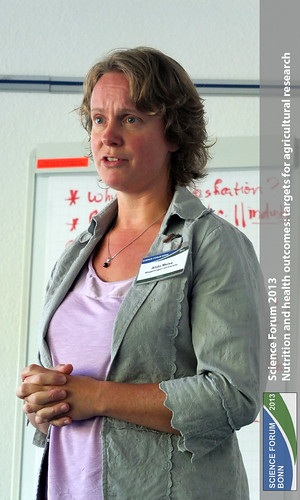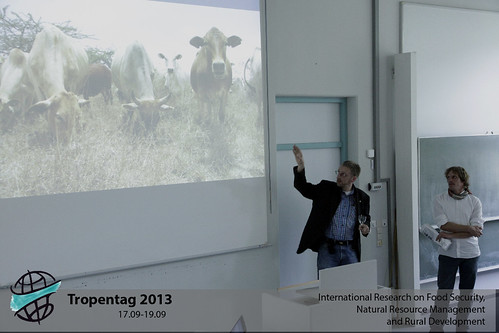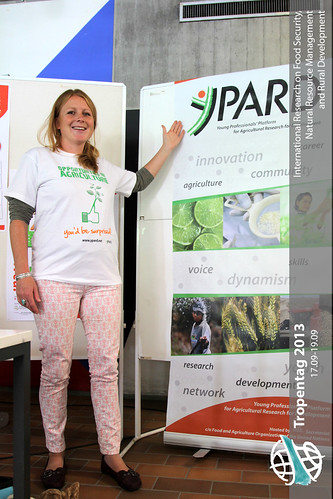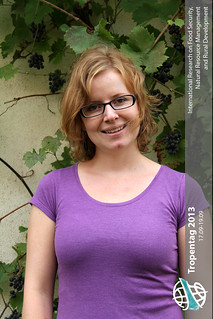Rahel Wyss's blog
Would you like to be fed with half a kilo of cassava per day?
Sun, 09/29/2013 - 18:15 — Rahel Wyss
Study as a proof of principles
“Why did you go to Kenya with cassava?” asked a Ghanian early career scientist from the audience during discussion, regarding a study about introduction of high β-carotene containing yellow cassava in Kenya. In fact, the Vitamin A deficiency of the population in Ghana would be much higher than in Kenya, he adds. The presenter from Wageningen University in Holland, Alida Melses responses: “The study is a proof of principle – it doesn’t matter where you work as long as you demonstrate that it works. The area was chosen by practical reasons.”
 Alida Melse-Boonstra, Wageningen University, Netherlands, about improving nutrition through staple foods in Africa
Alida Melse-Boonstra, Wageningen University, Netherlands, about improving nutrition through staple foods in Africa
 Alida Melse-Boonstra, Wageningen University, Netherlands, about improving nutrition through staple foods in Africa
Alida Melse-Boonstra, Wageningen University, Netherlands, about improving nutrition through staple foods in Africa
There is nothing like fish
Wed, 09/25/2013 - 16:05 — Rahel Wyss
If fish would be removed from peoples’ diet in Bangladesh, nothing else could replace that valuable nutrient-rich food. 70% of the Bangladeshi population is eating fish 7 to 14 times within two weeks. Studies prove the positive impact of small fish species on an improved dietary diversity. Moreover, the most important aspect of fish in terms of nutrition is that fish enhances the uptake of micronutrients from food eaten in the same meal. Not to forget, that consumers like the flavour and the added taste of fish to their meal.
European chicken populations are not prepared for future challenges
Thu, 09/19/2013 - 17:50 — Rahel Wyss
Livestock is a key livelihood component for poor households in developing countries but livestock diseases continually threaten the livestock assets, some of the local chicken populations are at risk of extinction, and in Europe there might be problems in the future with regard to conserving genetic diversity in chicken breeds.
 Christian Hülsebusch presenting a Boran Cattle Breeding Study done in Kenya
Christian Hülsebusch presenting a Boran Cattle Breeding Study done in Kenya
 Christian Hülsebusch presenting a Boran Cattle Breeding Study done in Kenya
Christian Hülsebusch presenting a Boran Cattle Breeding Study done in Kenya
Young and Professional in ARD? Get involved @YPARD in the exhibition hall!
Wed, 09/18/2013 - 16:00 — Rahel Wyss
YPARD is an international movement by Young Professionals FOR Young Professionals, to express their ideas and realize their full potential towards a dynamic Agricultural Research for Development. Register for free!
Key Actions of YPARD
⇒ Building a strong network
⇒ Giving voice to youth
⇒ Capacity building and information sharing
⇒ Promoting agriculture among young people
How you can contribute
⇒ Share your experiences
⇒ Give your opinion
⇒ Raise youth issues in strategic debates and discussions
 For more Information, meet Martina Graf, YPARD Europe representative now and only until Thursday 11:00am in the exhibition hall at the Tropentag!
For more Information, meet Martina Graf, YPARD Europe representative now and only until Thursday 11:00am in the exhibition hall at the Tropentag!
 For more Information, meet Martina Graf, YPARD Europe representative now and only until Thursday 11:00am in the exhibition hall at the Tropentag!
For more Information, meet Martina Graf, YPARD Europe representative now and only until Thursday 11:00am in the exhibition hall at the Tropentag!
Old fashioned or functional?
Wed, 09/18/2013 - 14:26 — Rahel Wyss
Since more than 15 years, ATSAF is kindly organizing annually the Tropentag in cooperation with various sponsors and universities. Among other activities, ATSAF supports young students with interest for journalism in science and is building up teams of competencies.
Rahel Wyss - Student Reporter 2013
Mon, 09/16/2013 - 13:06 — Rahel Wyss
Writing and being creative with photos and text is a passion of me; combining this interest with scientific knowledge is a great opportunity to learn and go deeper into certain topics and is also why I applied as a Student Reporter for the Tropentag 2013.
 I am currently enrolled in a Master Program at the Bern University of Applied Sciences, at the School for Agricultural, Forestry and Food Sciences in Switzerland (HAFL). I did my Bachelor in International Agriculture and am now majoring in Sustainable Agricultural and Forestry Production Systems.
My task as a Student Reporter will mainly be to take and edit photos from the different sessions. I find our international group of Student Reporters very inspiring and I am looking forward to work together for the Tropentag Blog on this interesting conference. We will give our best on making it most interesting also for YOU all out there.
I am currently enrolled in a Master Program at the Bern University of Applied Sciences, at the School for Agricultural, Forestry and Food Sciences in Switzerland (HAFL). I did my Bachelor in International Agriculture and am now majoring in Sustainable Agricultural and Forestry Production Systems.
My task as a Student Reporter will mainly be to take and edit photos from the different sessions. I find our international group of Student Reporters very inspiring and I am looking forward to work together for the Tropentag Blog on this interesting conference. We will give our best on making it most interesting also for YOU all out there.
 I am currently enrolled in a Master Program at the Bern University of Applied Sciences, at the School for Agricultural, Forestry and Food Sciences in Switzerland (HAFL). I did my Bachelor in International Agriculture and am now majoring in Sustainable Agricultural and Forestry Production Systems.
My task as a Student Reporter will mainly be to take and edit photos from the different sessions. I find our international group of Student Reporters very inspiring and I am looking forward to work together for the Tropentag Blog on this interesting conference. We will give our best on making it most interesting also for YOU all out there.
I am currently enrolled in a Master Program at the Bern University of Applied Sciences, at the School for Agricultural, Forestry and Food Sciences in Switzerland (HAFL). I did my Bachelor in International Agriculture and am now majoring in Sustainable Agricultural and Forestry Production Systems.
My task as a Student Reporter will mainly be to take and edit photos from the different sessions. I find our international group of Student Reporters very inspiring and I am looking forward to work together for the Tropentag Blog on this interesting conference. We will give our best on making it most interesting also for YOU all out there.




